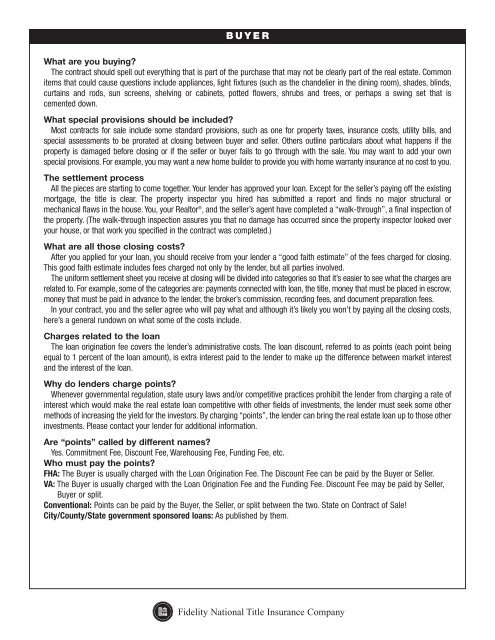Create successful ePaper yourself
Turn your PDF publications into a flip-book with our unique Google optimized e-Paper software.
BUYER<br />
What are you buying?<br />
The contract should spell out everything that is part of the purchase that may not be clearly part of the real estate. Common<br />
items that could cause questions include appliances, light fixtures (such as the chandelier in the dining room), shades, blinds,<br />
curtains and rods, sun screens, shelving or cabinets, potted flowers, shrubs and trees, or perhaps a swing set that is<br />
cemented down.<br />
What special provisions should be included?<br />
Most contracts for sale include some standard provisions, such as one for property taxes, insurance costs, utility bills, and<br />
special assessments <strong>to</strong> be prorated at closing between buyer and seller. Others outline particulars about what happens if the<br />
property is damaged before closing or if the seller or buyer fails <strong>to</strong> go through with the sale. You may want <strong>to</strong> add your own<br />
special provisions. For example, you may want a new home builder <strong>to</strong> provide you with home warranty insurance at no cost <strong>to</strong> you.<br />
The settlement process<br />
All the pieces are starting <strong>to</strong> come <strong>to</strong>gether. Your lender has approved your loan. Except for the seller’s paying off the existing<br />
mortgage, the title is clear. The property inspec<strong>to</strong>r you hired has submitted a report and finds no major structural or<br />
mechanical flaws in the house. You, your Real<strong>to</strong>r ® , and the seller’s agent have completed a “walk-through”, a final inspection of<br />
the property. (The walk-through inspection assures you that no damage has occurred since the property inspec<strong>to</strong>r looked over<br />
your house, or that work you specified in the contract was completed.)<br />
What are all those closing costs?<br />
After you applied for your loan, you should receive from your lender a “good faith estimate” of the fees charged for closing.<br />
This good faith estimate includes fees charged not only by the lender, but all parties involved.<br />
The uniform settlement sheet you receive at closing will be divided in<strong>to</strong> categories so that it’s easier <strong>to</strong> see what the charges are<br />
related <strong>to</strong>. For example, some of the categories are: payments connected with loan, the title, money that must be placed in escrow,<br />
money that must be paid in advance <strong>to</strong> the lender, the broker’s commission, recording fees, and document preparation fees.<br />
In your contract, you and the seller agree who will pay what and although it’s likely you won’t by paying all the closing costs,<br />
here’s a general rundown on what some of the costs include.<br />
Charges related <strong>to</strong> the loan<br />
The loan origination fee covers the lender’s administrative costs. The loan discount, referred <strong>to</strong> as points (each point being<br />
equal <strong>to</strong> 1 percent of the loan amount), is extra interest paid <strong>to</strong> the lender <strong>to</strong> make up the difference between market interest<br />
and the interest of the loan.<br />
Why do lenders charge points?<br />
Whenever governmental regulation, state usury laws and/or competitive practices prohibit the lender from charging a rate of<br />
interest which would make the real estate loan competitive with other fields of investments, the lender must seek some other<br />
methods of increasing the yield for the inves<strong>to</strong>rs. By charging “points”, the lender can bring the real estate loan up <strong>to</strong> those other<br />
investments. Please contact your lender for additional information.<br />
Are “points” called by different names?<br />
Yes. Commitment Fee, Discount Fee, Warehousing Fee, Funding Fee, etc.<br />
Who must pay the points?<br />
FHA: The Buyer is usually charged with the Loan Origination Fee. The Discount Fee can be paid by the Buyer or Seller.<br />
VA: The Buyer is usually charged with the Loan Origination Fee and the Funding Fee. Discount Fee may be paid by Seller,<br />
Buyer or split.<br />
Conventional: Points can be paid by the Buyer, the Seller, or split between the two. State on Contract of Sale!<br />
City/County/State government sponsored loans: As published by them.<br />
Fidelity National Title Insurance Company



